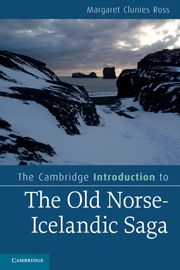Book contents
- Frontmatter
- Contents
- Tables
- A preface on practical issues
- Acknowledgements
- Abbreviations
- Chapter 1 Medieval Iceland
- Chapter 2 What is an Old Norse-Icelandic saga?
- Chapter 3 The genesis of the Icelandic saga
- Chapter 4 Saga chronology
- Chapter 5 Saga subjects and settings
- Chapter 6 Saga mode, style and point of view
- Chapter 7 Saga structures
- Chapter 8 The material record: how we know the sagas
- Chapter 9 Changing understandings of the sagas
- Notes
- Glossary of technical terms
- Guide to further reading
- References to volumes in the Íslenzk fornrit editions of Icelandic sagas
- Index
Chapter 2 - What is an Old Norse-Icelandic saga?
Published online by Cambridge University Press: 05 June 2012
- Frontmatter
- Contents
- Tables
- A preface on practical issues
- Acknowledgements
- Abbreviations
- Chapter 1 Medieval Iceland
- Chapter 2 What is an Old Norse-Icelandic saga?
- Chapter 3 The genesis of the Icelandic saga
- Chapter 4 Saga chronology
- Chapter 5 Saga subjects and settings
- Chapter 6 Saga mode, style and point of view
- Chapter 7 Saga structures
- Chapter 8 The material record: how we know the sagas
- Chapter 9 Changing understandings of the sagas
- Notes
- Glossary of technical terms
- Guide to further reading
- References to volumes in the Íslenzk fornrit editions of Icelandic sagas
- Index
Summary
The term Old Norse
This chapter will define salient terms and set the parameters for our discussion of the Old Norse-Icelandic saga. The first issue to be resolved is the meaning of the term ‘Old Norse’, which is a peculiar usage of the English-speaking world. Although it may have an old-fashioned ring to it, the term is a handy umbrella to be used when we want to refer to the languages, cultures and societies of Viking Age and medieval Norway and the Norwegian diaspora described in Chapter 1. In linguistic terms Old Norse most frequently refers to the West Scandinavian branch of the Scandinavian languages and their cultures, that is, Norwegian, Icelandic, Faroese, and the now defunct Orkney and Shetland Norn. It may also refer to the East Scandinavian languages and cultures, Swedish and Danish. This linguistic usage corresponds to the definition of the term Old Norse as applied to the whole of the Scandinavian language group in the second edition of The Oxford English Dictionary.
One might ask why we need such a term. The answer is that, particularly in the period between the ninth and twelfth centuries, it is often difficult to differentiate textual and material evidence coming from specific parts of the West Scandinavian language and cultural area as belonging to this or that region. Only gradually did the individual languages that became Faroese, Icelandic and Orkney and Shetland Norn differentiate themselves from their parent language, Norwegian. In addition, and importantly, the texts that emerged during this period in written form (although they may in many cases have had oral beginnings) are not always easy to assign to one or the other cultural group. The composition of the two major kinds of poetry, eddic and skaldic, is a case in point. Although a significant proportion of the poetry that has survived in written form has come down to us in Icelandic manuscripts from the thirteenth century and later, there is good reason to suppose that some poems predated the settlement of Iceland in some form or other, particularly if they have analogues in other Germanic languages like Old High German and Old English. Again, we have good reason to believe that the earliest skalds or court poets were Norwegian, but their compositions have mostly been written down in medieval Icelandic manuscripts of considerably later date.
- Type
- Chapter
- Information
- Publisher: Cambridge University PressPrint publication year: 2010



